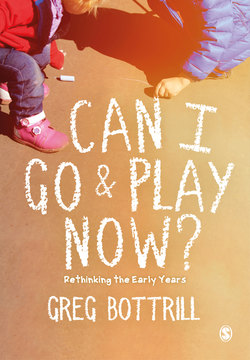Читать книгу Can I Go and Play Now? - Greg Bottrill - Страница 15
На сайте Литреса книга снята с продажи.
Your adult voice cannot be their voice
ОглавлениеWith the best will in the world, your half-termly themes such Spring, Chinese New Year, People Who Help Us, Under The Sea, Dinosaurs, and so on are not the children’s voice – they are yours. Nowhere in the EYFS does it say that these topics are what needs teaching, yet we find them in many Reception classes being taught year in and year out. But have the children expressed a desire to find out about these things? Have they ever once talked about or demonstrated how they would love to explore the role of the dentist to the extent that every bit of the continuous provision resembles a dental practice with a neat and tidy People Who Help Us display? I’m not denying that some of these themes contain within them some important messages, but I would equally argue that it doesn’t need often tenuous links to a theme because the adults have it in their planning and have had it in their planning since three years ago.
Thematic approaches are adult-led without a doubt – they drown out the child’s interests, look beyond them through a fug of ‘planned activity’ and prescribed outcome. A child-led approach is wild and free, it roams from minute to minute, hour to hour, day to day, sometimes veering off, sometimes simple, sometimes brilliant, sometimes soaring, often taking you to places you could never imagine: always exciting, always something different, forever changing, never standing still. Always, always beautiful.
‘Don’t be afraid of yourself ...’ Old Coast Road, The Church
So on one side we have the child’s world and on the other the adult’s. How to make the two come together, how to meet the needs and rights of the child to explore and discover while at the same time meeting our own adult needs for measurable progress and outcome? By itself, the beauty of children’s natural desire to interpret and express their world could quite happily exist without the influence of the adult world, but the need for data and accountability demands adult influence. The Senior Leadership Team demands an outcome.
In Early Years, the ‘goal’ is for the maximum number of children within your class to make Early Learning goals or above. It’s the crude measuring stick for both the child’s and your success. It’s the per cent that keeps you awake at night and makes you reach for that second glass of red on a Tuesday evening. The subsequent chapters of this book are going to show you just how to achieve this while balancing the need for children to be free, happy and childlike. Before we get to those chapters, we need to make sure that in our minds two things are clear: skills-focused learning and children’s Next Steps. Without these two central tenets you will never achieve your adult-led outcomes. As soon as you invest time and energy into creating a seascape in the Water Zone with magnetic letters and pretty sprinkles floating in the food-coloured water you are turning your back on skill-focused learning. If you find yourself doing circle time because that’s what you do every week on a Wednesday afternoon before home time, then you are turning your back. If your children are operating in a factory line waiting for the TA to ‘help’ them make a Mother’s Day card, then you are turning your back.
Everything, every detail of your day has to be committed to skills growth, to children applying their skills to situations and experiences, and opening up opportunities to develop new ones alongside them. Do you spend three weeks of Autumn term rehearsing your class Nativity? Ask yourself what skills are being truly developed. It’s a blunt question and if the answer is either ‘because we always do it’ or ‘because the parents like it’, then your Nativity might be something to rethink.
